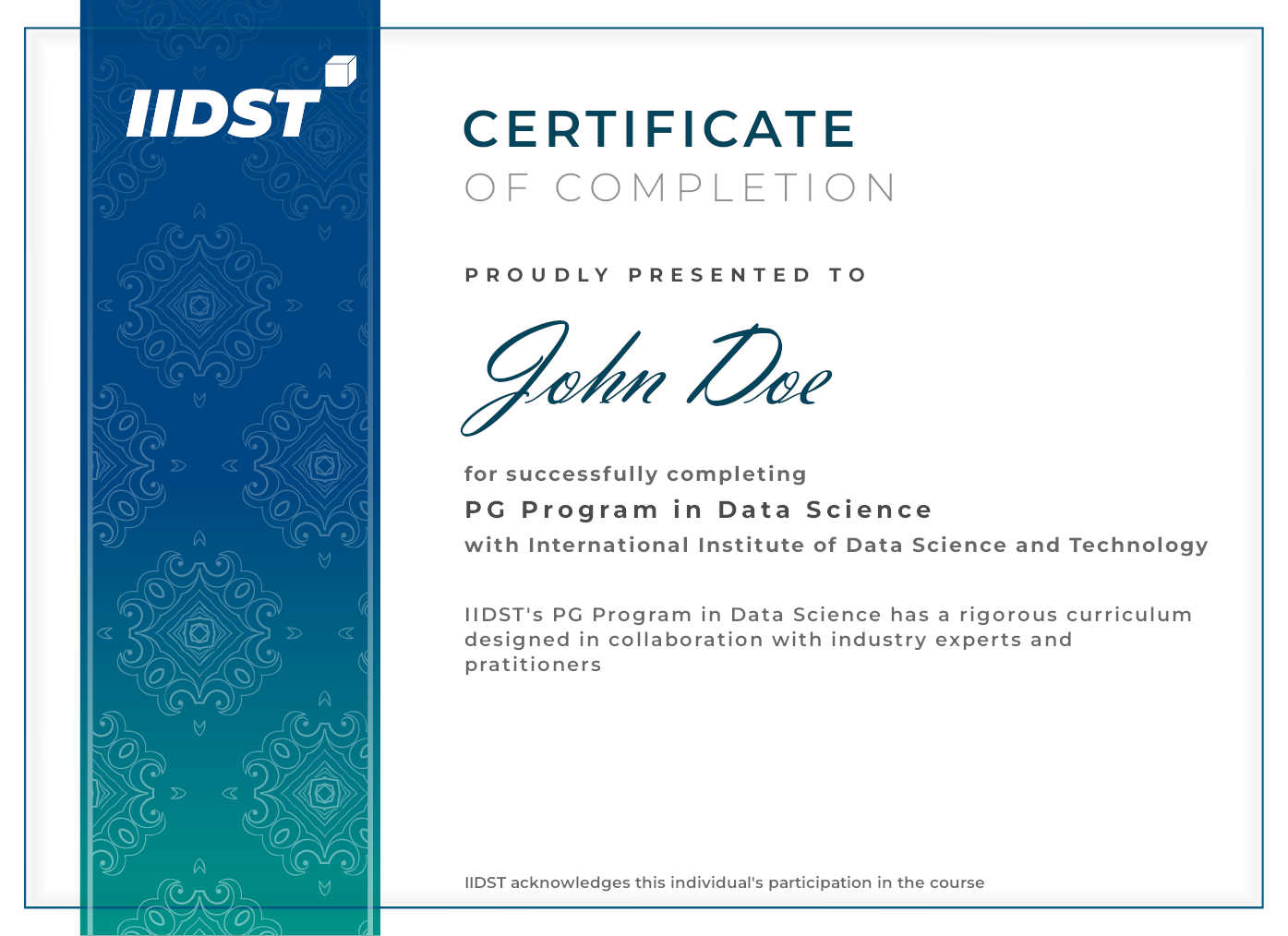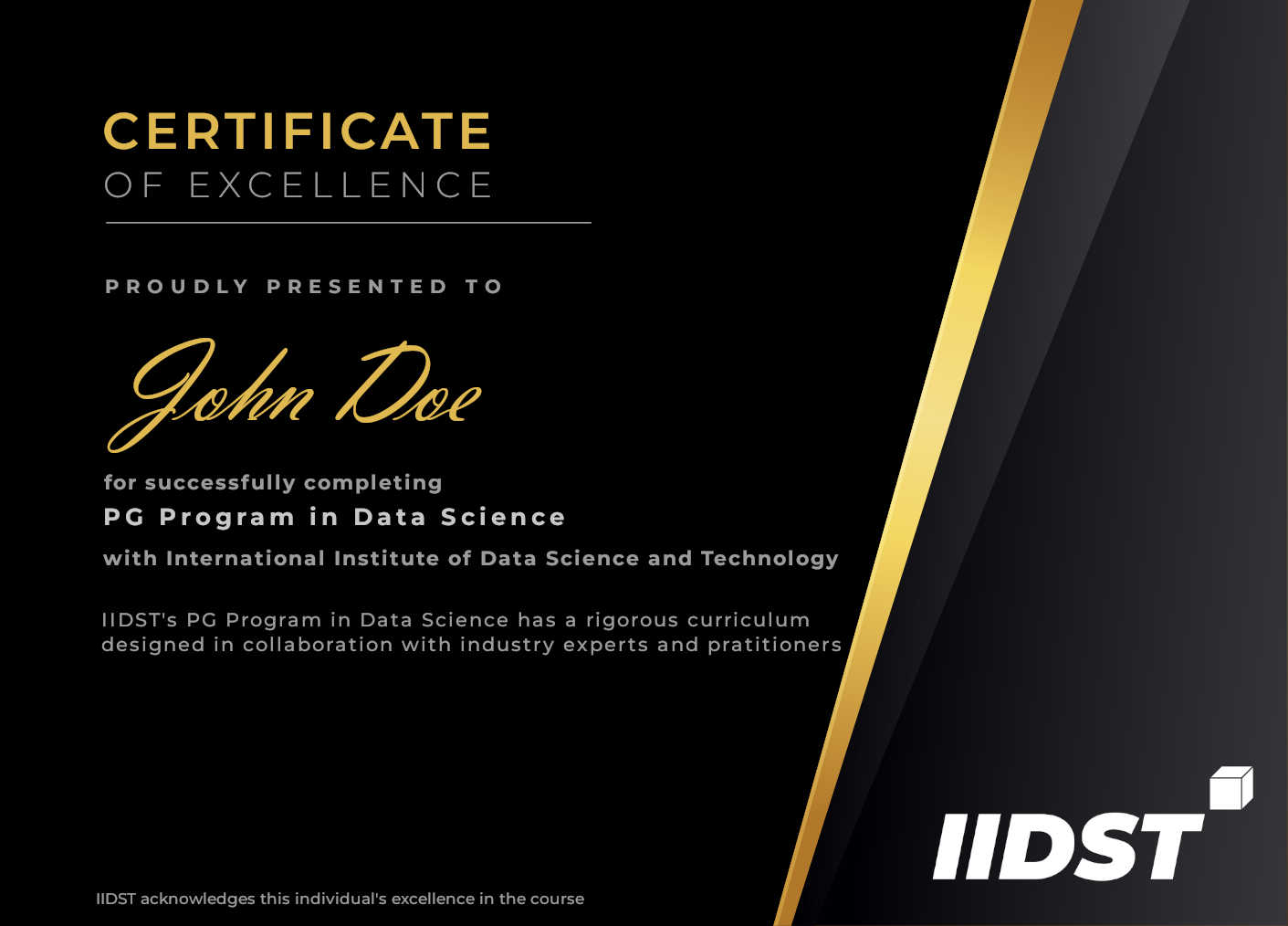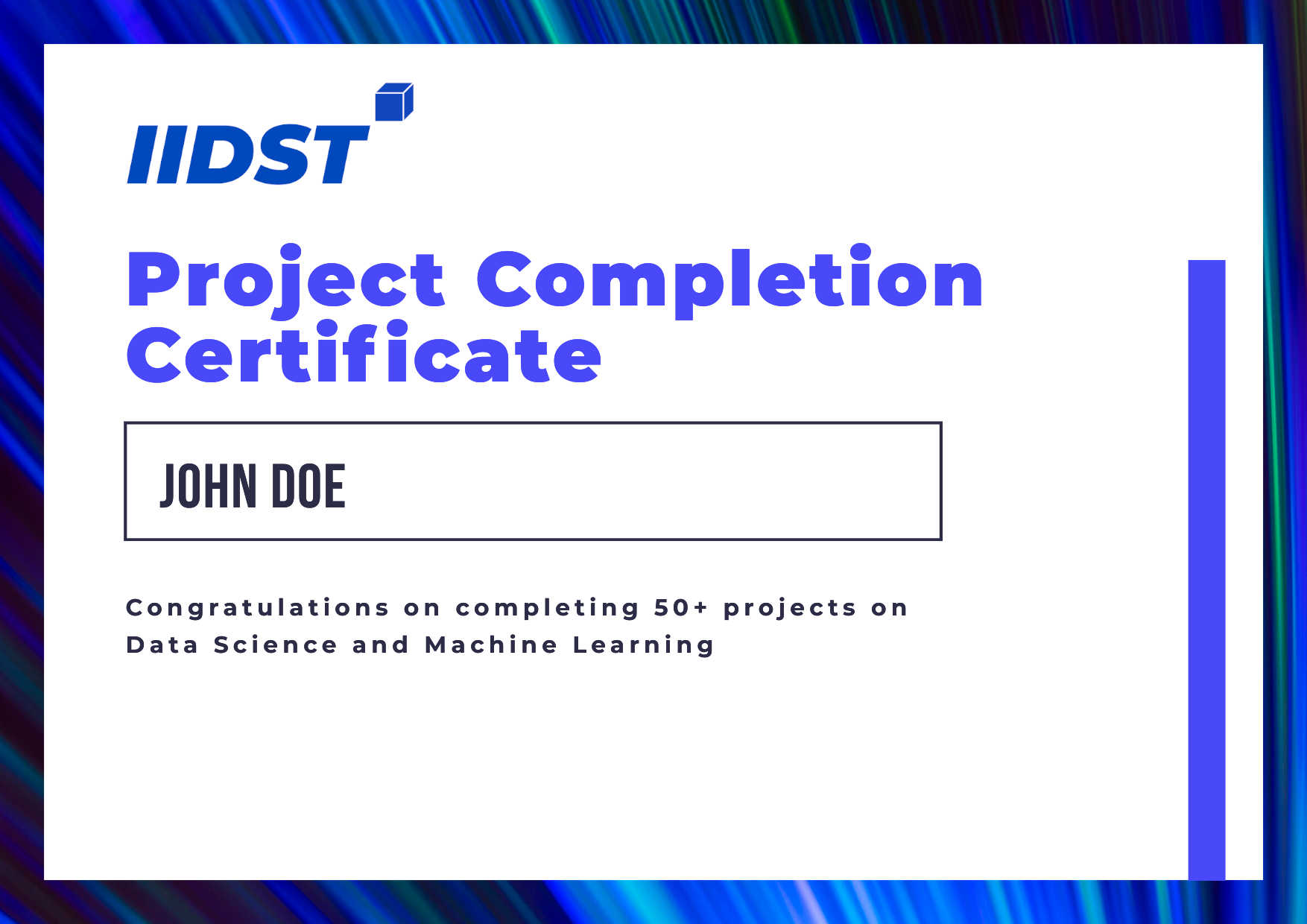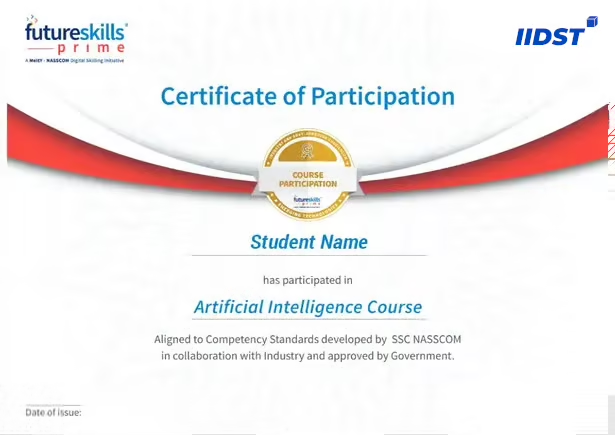- 12 Months
Why IIDST PG Program in Data Science?
The Data Science course offered by the International Institute of Data Science and Technology (IIDST) is curated with help of the industry experts and practitioners. IIDST's rigourous curriculum is designed so that you learn all the essential skills and have right guidance to help you secure your dream job in data science.

1:1 Mentorship and Top Instructors
Learn from industry-leading experts and get a monthly mentorship session to provide you with an expert guidance.
01

Industry-Relevant Curriculum
Master essential industry-relevant tools and languages used in data science and machine learning.
02

Projects and Case Studies
50+ projects and real-world case studies to provide in depth knowledge and enriched learning experience.
03

Robust Support and Networking
Instant doubt resolution with a robust support system and join a huge community of learners and alumni for networking and life long support.
04
Key Highlights
6-month Internship as part of program
Ideal for Working Professionals & Fresh Graduates
Monthly 1:1 Mentorship for Doubt Resolution
50+ Projects and Case Studies
Peer-to-Peer Learning
Updated Industry-Relevant Curriculum
Live Classes
Robust Placement Support
Tools and Languages Covered
Up-to-date industry relevent curriculum for rapidly evolving data science and machine learning domain
IIDST's PG program in data science provides curriculum which teaches you all the essential and latest tools and languages.
This data science course strengthens your foundation in data science and machine learning concepts. IIDST Data Science course curriculum is divided into 2 tracks AcademiX Track and CareerX Track
AcademiX Track
The AcademiX Track within the IIDST Data Science course unfolds across five strategically designed phases, fostering incremental skill acquisition and continuous growth. These distinct phases chart your progression, providing a detailed roadmap of the comprehensive learning journey. Each phase unveils specific data science skills, ensuring a methodical and steady expansion of your knowledge. Explore the following sections for a thorough breakdown of the content covered in each phase, guiding you through a structured and impactful educational experience tailored to the evolving landscape of data science.
- Excel
- Advance Excel
- Story Telling & Dashboard Creation
- SQL for Data Science
- Mathematics for Data Science
- Power BI
- Python Programming
- Data Wrangling
- Data Visualisation
- Machine Learning
- Big Data
- ML Ops
- Deep Learning
- Computer Vision
- Natural Language Processing
 Phase 1: Understanding & Exploring Data
Phase 1: Understanding & Exploring Data
Dive into the realm of data comprehension and exploration using MS Excel. Uncover the art of crafting impactful dashboards and compelling storytelling with your data. Enhance your analytical prowess as you navigate the powerful features of Excel, transforming raw information into insightful narratives for informed decision-making.
 Phase 2: Data Analytics
Phase 2: Data Analytics
Embark on a comprehensive data journey by mastering SQL for database interaction. Delve into the mathematical foundations of data science, covering probability and statistics. Elevate your analytical skills with a mastery of Power BI, becoming an expert in the dynamic field of data analytics.
 Phase 3: Python for Data Science
Phase 3: Python for Data Science
Unlock the world of data science by mastering Python. Initiate your journey with data wrangling, adeptly clean datasets, and delve into data visualization. Gain essential skills to manipulate and present data effectively, setting a solid foundation for your proficiency in the dynamic field of data science.
 Phase 4: Applied Machine Learning
Phase 4: Applied Machine Learning
Immerse yourself in the intricacies of machine learning, gaining profound insights into its core concepts. Explore the fundamentals of big data, unraveling its potential for transformative insights. Additionally, delve into the essentials of ML Ops, equipping yourself with the skills to streamline and optimize machine learning workflows for real-world applications.
 Phase 5: Advanced Data Science
Phase 5: Advanced Data Science
Advance your data science expertise by delving into cutting-edge topics. Explore the intricacies of deep learning, unravel the world of computer vision, and master the nuances of natural language processing. Equip yourself with advanced skills, unlocking new dimensions in the dynamic and evolving field of data science.
CareerX Track
The CareerX Track within the IIDST Data Science course unfolds across four strategic phases, guiding you comprehensively through interview processes, encompassing screening, technical, HR, and salary discussions. Initiating with Data Structures and Algorithms (DSA) and competitive programming, it enhances your coding prowess for interviews. Subsequently, we assist in crafting a compelling resume, optimizing your LinkedIn and GitHub profiles, and conduct mock interview rounds for hands-on experience. This holistic approach ensures not just technical proficiency but also equips you with essential soft skills, providing a well-rounded preparation for the multifaceted demands of data science career interviews.
- Data Structure & Algorithms
- Competitive Programming
- Resume Building
- Cover Letter
- LinkedIn Optimization
- GitHub Optimization
- Communication Skills for Interview
- Interview etiquette
- Aptitude Preparation Kit
- Company-wise Guides
- Mock Interviews
 Phase 1: Advance Programming
Phase 1: Advance Programming
Enhance your programming prowess through Advanced Programming, gaining valuable insights into competitive programming. Elevate your coding proficiency, significantly boosting your likelihood of excelling in technical interview rounds. This comprehensive learning experience sharpens your skills, positioning you for success in the dynamic landscape of programming challenges and technical assessments.
 Phase 2: Profiling
Phase 2: Profiling
Master the art of crafting standout resumes and compelling cover letters to enhance your chances of being shortlisted. Grasp the significance of optimizing your LinkedIn and GitHub profiles. Gain insights into tailoring your resume for specific job descriptions, maximizing your appeal to potential employers and securing opportunities effectively.
 Phase 3: Softskills
Phase 3: Softskills
Cultivate essential soft skills—communication, interview etiquette, body language, and email writing—to excel in interview rounds. Elevate your professional presence and interpersonal abilities, ensuring you make a lasting impression and effectively navigate the nuances of job interviews. Mastering these soft skills is integral to securing success in your career endeavors.
 Phase 4: Interview Preparation
Phase 4: Interview Preparation
Equip yourself for success with our comprehensive interview preparation resources, including an aptitude preparation kit, company-specific guides, and invaluable mock interviews. Enhance your confidence and readiness as you delve into targeted preparation, ensuring you are well-prepared for the challenges posed by various companies during the interview process.
Book your seat now
Learn from the Mentors who are
The Real Industry Experts
Become Eligible For 5 Industry-Recognized Certificates



Experience Letter
Get a 6-month Internship Experince Letter from the company that you will be doing your course integral internship.
The 6-month Internship guarantees you a practical hands-on experience of the new data science and machine learning skills that you have acquired during IIDST's data science course.

Hear from Our Learners
Program Fee
Our program fee is structured to provide exceptional value, offering comprehensive training, hands-on projects, and expert mentorship at an affordable cost. With pay after placement option available, investing in your data science education has never been more accessible. Join us and unlock the doors to a rewarding career in data science today!
Program Fee
Fee Structure
₹ 2,60,000
+ 18% GST
* ₹60,000 + Taxes to be paid upfront at the time of enrolment
- Easy pay option with monthly EMIs available
Get Started Now
Join the community of aspirants just like yourself and grow faster
45550
+
Active Learners
Become a master in your field and grab your dream job
5000
+
Career Transitions
India's best platform for Data Science course with an option to Pay After Placement.
Frequently Ask Questions
- What is data Science?
- Who should take a Data Science course?
- Do I need a technical background for Data Science?
- Can I learn Data Science online?
- Is this course suitable for beginners?
- What skills are required to become a data scientist?
- What is the role of a Data Scientist?
- How will Data Science help me in my career?































